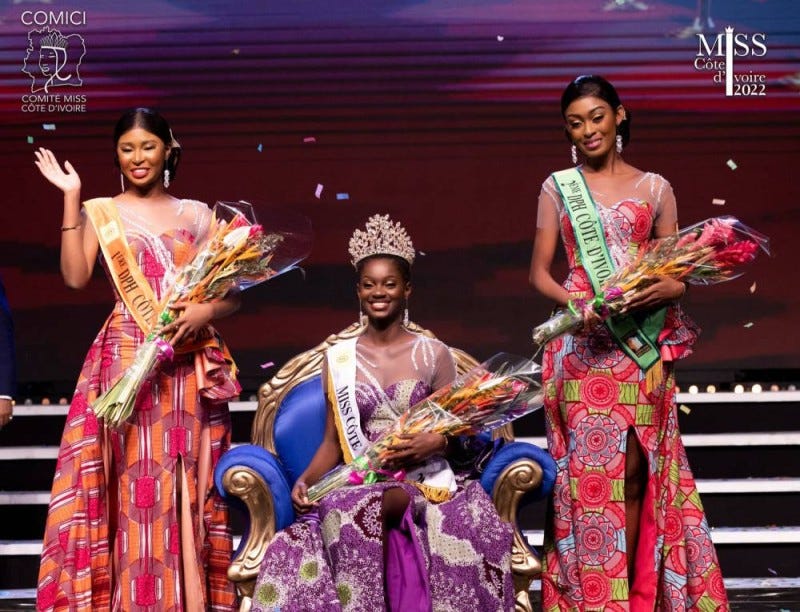Miss Côte d'Ivoire Bans All wigs And Weaves
"We want the candidates to be natural - whether with braids or straightened hair, it should be their own. Beauty must be raw," Victor Yapobi, president of the Miss Côte d'Ivoire
Hair is never just hair. It always comes down to that and really, is there a relationship more complicated than the one between a Black woman and her hair?
This year, the Miss Côte d'Ivoire beauty pageant (Miss Côte d'Ivoire is a national beauty pageant that selects Ivory Coast's official representatives in Miss World and Miss Universe) decided to switch things up: for the first time, contestants were banned from wearing wigs or weaves during any stage of the competition. “We want the candidates to be natural – whether with braids or straightened hair, it should be their own. Beauty must be raw,” said Victor Yapobi, president of the Miss Côte d'Ivoire organising committee, in an interview with the BBC. What does raw beauty even mean?
At first, I’ll admit, I was sceptical – okay, super irritated. Another set of rules about what Black women can and can’t do with their hair? Here we go again. If a Black woman wears her hair natural, it’s called “unkempt.” Straightens it? She’s accused of selling out. Wears a wig? She’s fake. Styles out an afro? She’s “making a statement.” There’s no winning. So yes, initially, I was ready to come for the Miss Côte d'Ivoire pageant with full force.
Toxic beauty standards are nothing new, and when it comes to hair, Black women have historically been positioned furthest from the dominant ideals. In pre-colonial African societies, hair was never just about aesthetics. Length, texture, and intricate styling all carried deep meaning – reflecting lineage, social status, spirituality.
Hairstyles were a language, and braiding was a communal act of bonding, artistry, and identity. Then came colonisation, and with it, Western beauty ideals that categorically positioned Black features as inferior. Afro-textured hair, a source of pride and expression, was degraded – described as "woolly" or "cotton-like" – while "good hair" became code for anything straighter, smoother, more European. (If you’re interested, I wrote more about the colonialism and Black hair here)
I was so caught up in the idea of Black women’s choices being policed, that I neglected to consider wigs and weaves don’t necessarily represent freedom either. Not when afro hair has been systematically rejected for centuries. If the starting point is rejection, then “choice” isn’t really about empowerment; it’s about survival. Bleak.
Because the reality is, Black women and hair? It’s complicated. It’s layered, nuanced, and exhausting (for Black women). And maybe, just maybe, there’s more to this change than my first reaction allowed. (Or maybe not)
“When it comes to black women and in this instance how they the use their beauty as a currency to compete for real world rewards, it’s clear that these mandate are yet another example of an overall desire to dictate and control how black women choose to interact with their hair. A long winded argument that still leave black women on a knife edge of the beauty standards power struggle rather than liberation.” Ata-Owaji Victor, freelance beauty journalist and founder of Substack newsletter The Reset.
According to the organisers, the new rule has been largely welcomed by the contestants themselves. And that matters. I’m not a pageant girl, but millions are. And if more Black girls see women winning crowns with their natural hair, maybe it chips away – even just a little – at the impact of harmful beauty standards. Of course, it’s not as black and white as that. The people in support are not the voice of Black women, nor all women in Ivory Coast. And of course, Black women are allowed to have and voice a myriad of opinions regarding this ban, it’s complex. This conversation has to be nuanced. Each woman, has her own relationship with hair.
I’m still sceptical, of course. Institutional beauty standards are slippery. They sneak back in under new disguises, almost as if they never left. I wonder how this will play out long term. How beauty standards will or will not manifest?
I do think that this is more than just representation for the Ivory Coast pageant. And while, it’s a positive to see more Black women on stage with natural hair, representation is not everything. It does nothing to take away years of harm, impact on mental health and self worth and nothing to unpick the systemic biases regardless of the crown.
Maybe this isn’t perfect. Maybe it’s more about disrupting the landscape, even slightly. Maybe it’s about recognising that natural hair doesn’t need to be hidden or forced into an unnatural state. But this is a pageant after all – and there’s no denying that pageants have been tools of patriarchal control, affecting women, all women. A tool that promotes conformity, despite how uncomfortable it may be. When the end goal is to be considered beautiful and when beauty and whiteness are almost always synonymous, pageants are part of a cruel act.
It might be a stretch, but Audre Lorde talks a lot about decolonising beauty, and how reclaiming beauty on one’s own terms is a radical act. Maybe this is a small step towards that? I did say it was a stretch!
Pageants and the beauty industry as a whole has a poor track record at valuing different versions of beauty. This has shaped how women view themselves, when it comes to outward appearance and being critical of this system is long overdue. But today, I’m choosing to celebrate the small steps (with a lot of maybes, because we’re all trying to work it out for ourselves). Because honestly? We deserve that.




